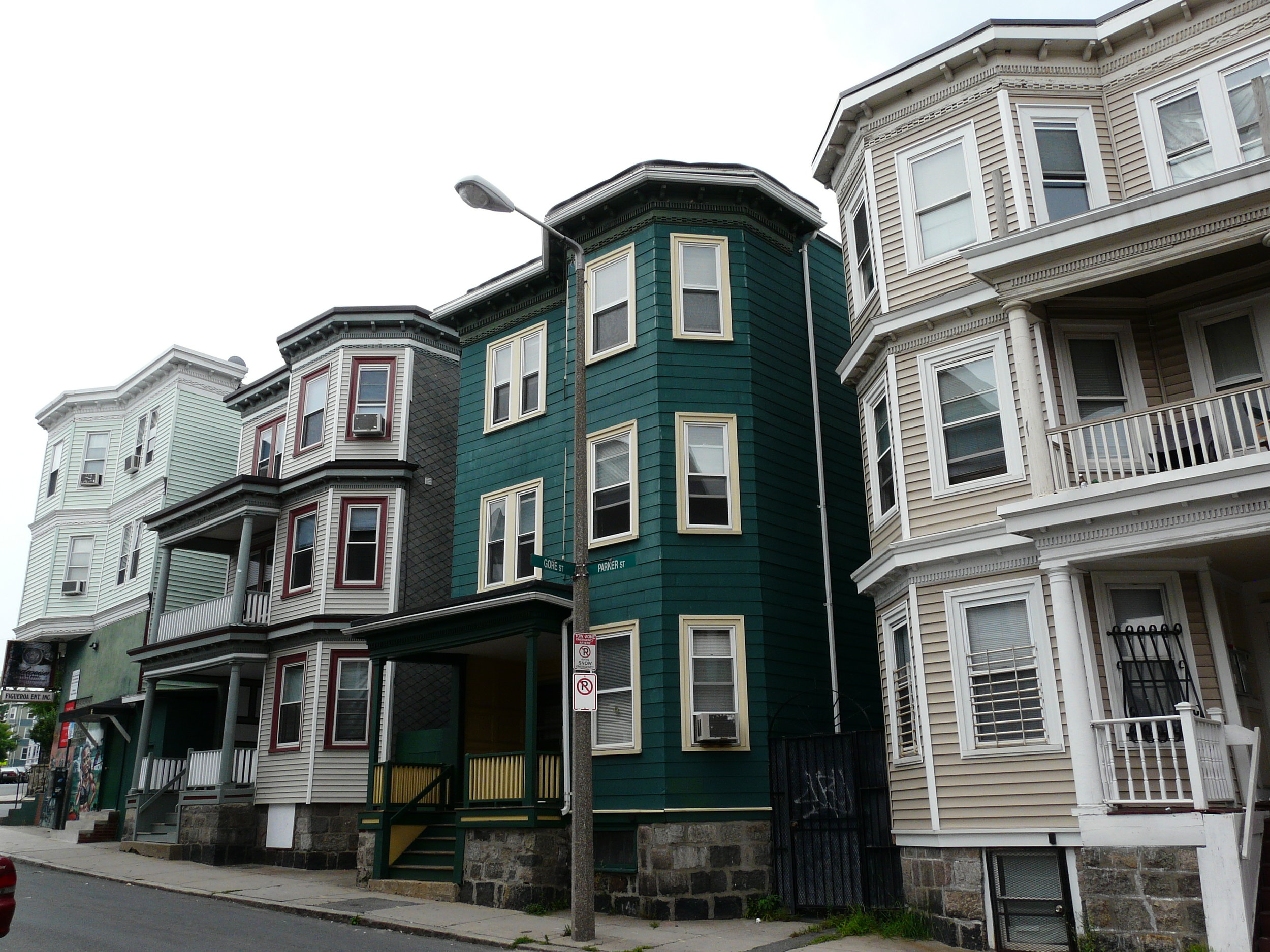Housing Policy
Photo credit: Unknown, Creative Commons Zero.
Introduction
This page highlights inequalities and injustices related to housing and housing development. Housing policies in the U.S. were and are designed to promote racial and class separateness, and to develop intergenerational wealth for at least some white Americans; see Racism in Housing for resources dedicated to that. The following video clip is from our 2019 Conference: Healing Atonement and illustrates why housing policy is such an important concern.
Messages and Resources on Christian Faith and Housing Policy
Sangwon Yang and Mako Nagasawa, The Myth of Meritocracy in Housing, Part 1
The Anastasis Center Blog, Nov 3, 2018. A 10 minute read. This post follows a Christian critique of John Locke’s theology of private property. It highlights racial covenants from the early 20th century.
Sangwon Yang and Mako Nagasawa, The Myth of Meritocracy in Housing, Part 2
The Anastasis Center Blog, Nov 5, 2018. A 10 minute read. This post highlights the post-WWII U.S. policies on housing and real estate development, including the FHA and GI Bill. This and subsequent posts highlight the impact of racially segregated housing patterns on public schooling and policing.
Sangwon Yang and Mako Nagasawa, Restorative Justice in Housing
The Anastasis Center Blog, Mar 25, 2019. A 10 minute read. This post explores how theological aspects of retribution influence views on housing in the U.S.
Other Resources on Housing Policy
Wikipedia, Housing First (Wikipedia article)
Christopher Silver, The Racial Origins of Zoning in American Cities. Arizona State University, 1997. (pdf file) Study that starts from the early 1900's.
Janine DeFao, Oakland Tenants Get Big Settlement / Decrepit Apartments to Be Fixed Up. San Francisco Gate, Oct 17, 2000. and Judith Scherr, Tenants Win Big Fraud Case Against Landlord. East Bay Express, Mar 2, 2011.
Leyla Gulcur, Ana Stefancic, Marybeth Shinn, Sam Tsemberis, Sean N. Fischer, Housing, Hospitalization, and Cost Outcomes for Homeless Individuals with Psychiatric Disabilities Participating in Continuum of Care and Housing First Programmes. Journal of Community and Applied Psychology, Apr 3, 2003. “This article compares two approaches to housing chronically homeless individuals with psychiatric disabilities and often substance abuse… Overall results support the Housing First approach.”
Dorothy Brown, How Home Ownership Keeps Blacks Poorer Than Whites. Forbes, Dec 10, 2012.
Deborah Siegel, Reducing Homelessness With the Housing First Model — Does It Work? Social Work Today, Vol 17, No 5, p.18.
Eamonn Fingleton, In World's Best-Run Economy, House Prices Keep Falling -- Because That's What House Prices Are Supposed To Do. Forbes, Feb 2, 2014. Germany a helpful counterexample; although more recently, Patrick Collinson, Berlin Tops the World as City with the Fastest Rising Property Prices. The Guardian, Apr 10, 2018.
Kenneth Rapoza, These Are The Foreigners Buying Up American Real Estate. Forbes, Jul 10, 2014. “Foreign purchases jumped to 35% last year, and Chinese customers led the way with $22 billion out of the $92.2 billion total spent by foreign buyers”
Fredrick Kunkle, “Housing First” Approach Works for Homeless, Study Says. Washington Post, Mar 4, 2015.
Kelly McEvers, Utah Reduced Chronic Homelessness By 91 Percent; Here's How. NPR, Dec 10, 2015. "Housing First"
Pam Fessler, Which U.S. Cities Face Challenges In Reducing Homeless Population. NPR, Dec 11, 2015. Cities addressing homelessness, some cities continue criminalizing it.
Daniel Poremski, et al., Effects of Housing First on Employment and Income of Homeless Individuals: Results of a Randomized Trial. Journal of Psychiatric Services, 2016.
Erin Kelly and Savannah Cox, In Wealthy Hong Kong, The Poor Are Living In Wire Cages. All That’s Interesting, May 22, 2016.
Newser Editors, Average Size of US Homes, Decade by Decade. Newser, May 29, 2016. Referencing Evan Comen, The Size of a Home the Year You Were Born. 24/7 Wall Street, May 25, 2016. See also U.S. Census Bureau, Characteristics of New Housing. U.S. Census Bureau.
Jon Gorey, What Real Estate Agents, Sellers Have to Tell Buyers - And What They Don't. Boston Magazine, Jun 1, 2017. Re: lack of transparency
Diana Olick, Foreigners Snap Up Record Number of US Homes. CNBC, Jul 18, 2017. In 2017, even despite a strong dollar, foreigners bought real estate in the U.S. at record levels: $153 billion of real estate, an increase of 49% over the previous year.
Cameron Murray, New Paper: Developers Pay Developer Charges. Fresh Economic Thinking, Feb 6, 2018. Cameron K.Murray, Developers Pay Developer Charges. Cities Journal, Apr 2018.
Matt Levin, Data Dig: Are Foreign Investors Driving Up Real Estate in Your California Neighborhood?. CALMatters, Mar 7, 2018. “Back in 2006, about 10 percent of California single-family homes were purchased in all-cash transactions, according to the real estate data firm ATTOM Data Solutions. A decade later, it’s nearly 25 percent.” An indication of foreign buyers.
Michelle Conlin, Spiders, Sewage, and a Flurry of Fees — The Other Side of Renting a House from Wall Street. Reuters, Jul 27, 2018.
Lucy Wang, Rural Studio’s 20K Homes Reveal the Systemic Problems Behind Affordable Housing. Dwell, Aug 8, 2018. “In rural Western Alabama, a student-led program evolves from building $20,000 homes to creating a blueprint for sustainable, affordable housing.”
Noah Smith, Ben Carson and HUD Get Ready to Take On the Nimbys. Bloomberg, Sep 12, 2018. proposal to roll back "not in my backyard" zoning rules to allow more housing development.
Luis Quintero, Fewer Players, Fewer Homes: Concentration and the New Dynamics of Housing Supply. Johns Hopkins Carey Business School, Dec 19, 2018. See summary by Patrick Ercolano, Domination of Housing Markets by Few Builders Poses Risk to Overall Economy, Study Suggests. HUB | Johns Hopkins University, Dec 26, 2018. See interview by Futurity: Johns Hopkins University, Homebuilder Monopolies Create Housing Crunch. Futurity, Sep 12, 2023.
Jessica Rinaldi, African Americans’ Economic Setbacks from the Great Recession Are Ongoing – and Could Be Repeated. The Conversation, Feb 5, 2019
Alana Semuels, When Wall Street Is Your Landlord. The Atlantic, Feb 13, 2019. “With help from the federal government, institutional investors became major players in the rental market. They promised to return profits to their investors and convenience to their tenants. Investors are happy. Tenants are not.”
Editor, How New Orleans Reduced Its Homeless Population By 90 Percent. NPR, Feb 19, 2019.
John Iadarola, Which Democrat Has The Best Housing Policy? The Damage Report, Feb 26, 2019. re: Elizabeth Warren, Kamala Harris, Cory Booker
ATTOM Staff, Seriously Underwater U.S. Properties Increase From A Year Ago. ATTOM Data Solutions, May 7, 2019.
John Horvat, Real Families Don’t Need Government Programs. The Imaginative Conservative, Mar 24, 2019. Ironic for all the overlooking of real history of government supporting white families
Farhad Manjoo, America’s Cities Are Unlivable. Blame Wealthy Liberals. New York Times, May 22, 2019. Re: California politics, single occupancy zoning laws, and resistance to change.
Michael Hobbes, Why America Can’t Solve Homelessness. Huffington Post, May 19, 2019.
David Brooks, The Welfare State Is Broken. Here’s How to Fix It. New York Times, May 27, 2019. “A social entrepreneur in Britain shows the way.” The most telling issue was housing: “Ella and the team worked together to stabilize her most immediate issue — negotiating away eviction notices.” This demonstrates that the Housing First approach - a different housing policy where we view housing as part of a human rights fabric - is required to “fix” the welfare system without throwing people into homelessness. But do Brooks and other conservatives have the heart, mind, and stomach to undo the racial and class prejudice built into the U.S. housing market?
Ana Kasparian, Wealthy Investors Playing the Victim in the Housing Crisis. The Young Turks, Jun 3, 2019. Examines Los Angeles and points out how the manipulation of zoning laws favors high end housing development, which is in decline, while low income and homeless people struggle
Jon Henley, 'It’s a Miracle': Helsinki's Radical Solution to Homelessness. The Guardian, Jun 3, 2019. Re: Housing First programs.
Laurel Wamsley, Oregon Legislature Votes To Essentially Ban Single-Family Zoning. NPR, Jul 1, 2019. See also Michael Andersen, Maps: Portland’s 1924 Rezone Legacy is ‘A Century of Exclusion’. Sightline Institute, May 25, 2018. Andersen gives background.
David Doel, American Housing Turns Dystopian. The Rational National, Jul 8, 2019. Compares CA bunk beds in SF for $1200 to social housing in Austria and other parts of Europe; see Adam Forrest, Vienna’s Affordable Housing Paradise. Huffington Post, Jul 19, 2018.
Erick Trickey, How Minneapolis Freed Itself From the Stranglehold of Single-Family Homes. Politico, Jul 11, 2019. “Desperate to build more housing, the city just rewrote its decades-old zoning rules.”
Dylan Matthews, America Has a Housing Segregation Problem. Seattle May Just Have the Solution. Vox, Aug 4, 2019. providing information about schools, assistance to fill out applications, and information about additional financial assistance
Ed O’Loughlin, Housing Crisis Grips Ireland a Decade After Property Bubble Burst. New York Times, Aug 8, 2019. “Dublin has become one of the world’s most expensive places to rent, ahead of Tokyo, Sydney and Singapore” largely due to foreign capital investors and land hoarding by investors
Timothy Egan, The Great Western Public Land Robbery. New York Times, Aug 16, 2019. “Trump’s pick to be the steward of America’s public lands doesn’t believe in public lands”
Brian Goldstone, The New American Homeless. The New Republic, Aug 21, 2019. “Housing insecurity in the nation’s richest cities is far worse than government statistics claim.” Discusses the wide range of housing discrimination faced by minorities.
Richard D. Kahlenberg, Minneapolis Saw That NIMBYism Has Victims. The Atlantic, Oct 24, 2019. “Single-family zoning hurts a lot of people. In Minnesota’s largest city, reformers put them front and center.” See rebuttal by Carol Becker, Mostly Wrong: The Atlantic Article “Minneapolis Saw That NIMBYism Has Victims”. Vox, Oct 25, 2019.
David Dudley, Secrets of the World’s Most Livable City. Bloomberg, Oct 29, 2019. Vienna, a city of about 2 million, is adding about 25,000 new residents annually, and adds about 13,000 new units of housing to accommodate them. “We have to build a small town each and every year,” Vassilakou told the audience. But unlike in many North American cities, population growth isn’t coming in the form of suburban-style sprawl and an unaffordable central city, thanks to strict land-use codes and serious government subsidies for housing. About half the city is reserved for green space, she said, and 62 percent of the population, including a broad middle class, lives in social housing. This housing-as-a-human-right emphasis is a key element in the city’s vaunted livability. The Viennese social housing model is a century-old tradition that endures despite population pressure from immigrants and political turmoil from the rise of the far-right national Freedom Party; it’s often invoked by affordability advocates in other cities as the gold standard in public housing. Many subsidized units are owned directly by the government, and rent control assures that housing costs remain a relatively modest share of residents’ annual income, especially compared to costly capitals like London or Washington, D.C. See also The Gravel Institute, How Socialists Solved The Housing Crisis. The Gravel Institute, Jan 29, 2021. Due to the profit motive, we have plenty of housing for the rich, which often goes vacant or sold to international buyers. We do not have enough for the middle class and the poor. The contrast is with Vienna, Austria, which implemented high quality social housing built by the government and paid for by taxes on the wealthy. See also Bloomberg CityLab, Vienna's Radical Idea? Affordable Housing For All. Bloomberg Originals, Sep 17, 2021.
Ana Kasparian, Secret to Affordable Housing Success. No Filter | The Young Turks, Nov 12, 2019. how rent control can work, combined with zoning and taxing laws so there are lower incentives for landlords/owners to sell housing stock to other developers
Ana Kasparian, Real Estate Just As Toxic As Fossil Fuel Industry. No Filter | The Young Turks, Nov 13, 2019. American real estate market does money laundering for foreign investors and governments, in addition to contributing to gentrification pressure
Simon Rios, MIT Study: Boston Evictions Happening 'Orders Of Magnitude' More In Low-Income Neighborhoods. WBUR, Nov 13, 2019.
Konstrast.at, Finland Ends Homelessness and Provides Shelter for All in Need. Scoop, Nov 14, 2019. how Finland’s Housing First efforts since 2008 have had very positive effects
The Economist, How an Obsession with Home Ownership Can Ruin the Economy. The Economist, Jan 22, 2020. very important comparison with Switzerland, which prioritizes renting, not owning. Ownership favors segregation, restrictive zoning, restrictive supply, a population less willing to move to find work, thus unemployment. Critiques mortgage interest deduction on taxes as a distortion of the housing market.
Amy Goodman and Juan Gonzalez, Detroit Overtaxed Residents by $600M, Causing Foreclosure Crisis. Residents Are Now Fighting Back. Democracy Now, Feb 14, 2020. city property taxes were illegal, as they were set higher than legal limits; Detroit is 85% black.
David Brooks, The Nuclear Family Was a Mistake. The Atlantic, Mar 2020. “The family structure we’ve held up as the cultural ideal for the past half century has been a catastrophe for many. It’s time to figure out better ways to live together.”
Seth Meyers, The Check In: Trump’s Family Profits Off Policy Meant to Help Low-Income Communities. Late Night with Seth Meyers, Mar 10, 2020. re: “Opportunity Zones” loopholes
Krystal Ball and Saagar Enjeti, Aaron Glantz on Are We Headed for Another Housing Crisis? Rising | The Hill, Mar 26, 2020. 3.3 million unemployment claims.
PolyMatter, How Singapore Solved Housing. PolyMatter, May 1, 2020. Strong social housing, publicly funded.
Suse Steed, How Did Houses End Up Earning More Than People? Suse Steed, Jun 1, 2020. “Because our economy is dependent on house prices rising, our politicians are too… House prices are high not because anyone did anything clever but largely because of economic policies like Quantitative Easing which I think will turn out to be profoundly stupid. High house prices aren’t something to sit around and discuss over dinner, they are something to change.”
Sharon Cornelissen, Alexander Hermann, A Triple Pandemic? The Economic Impacts of COVID-19 Disproportionately Affect Black and Hispanic Households. Joint Center for Housing Studies at Harvard University, July 7, 2020.
Second Thought, America's Looming Eviction Crisis. Second Thought, Jul 17, 2020. notes that the private equity firm Blackstone bought 30,000 homes during the financial crisis of 2008-09, and private equity firms are not likely to be kind landlords during the COVID pandemic
Conor Sen, Your Net Worth Is America’s Secret Economic Weapon. Bloomberg, Aug 20, 2020. “Soaring stock and home prices can make this recovery much stronger than the last one.” An optimistic view of the possibility of economic recovery and the likely breadth of one. He ignores the declining rate of homeownership to 65%, which is a measure of how many homes are occupied by owners, not how many adults own homes, which is lower (adult children living with parents, dependent elderly, etc.. . He also ignores the fact that participation in the stock market is highly skewed towards the wealthy (~86% in the top decile of wealth. , and 50% of Americans own no stock. See Governor Lael Brainard, Is the Middle Class within Reach for Middle-Income Families? Federal Reserve, May 10, 2019.
Richard Fry, Jeffrey S. Passel, and D’Vera Cohn, A Majority of Young Adults Live with Their Parents for the First Time Since the Great Depression. Pew Research Center, Sep 4, 2020. suggests much about the rise of home prices, the effect of student loans, and the stagnation of wages. There are some racial differences but the differences have decreased over time.
Krystal Ball, New “Uber for Evictions” Startup Previews Our Hellish Future. Rising | The Hill, Sep 22, 2020. re: Civvl, a new company that subcontracts people to evict tenants. Our capitalist economy pits lower-income people against their brethren.
Hobbie Stuart, Breadtube vs Economics #1: Response to Philosophy Tube on Housing. Unlearning Economics, Oct 27, 2020.
Krystal Ball and Saagar Enjeti, Wall Street CEO Brags About Hiking Rents During Pandemic. Rising | The Hill, Dec 14, 2020. private equity firm Blackrock bought up real estate from 2008 - 09, and is likely to profit from evictions and government funding if the real estate market declines
Not Just Bikes, Introduction to Strong Towns & Financially Insolvent American Cities. Not Just Bikes, Nov 2, 2020. A 5 minute video discussing city design from the reviews of the Strong Towns initiative. Focuses on how mixed use buildings -- residential and commercial -- generates more money for cities than big box outdoor malls. Not Just Bikes, How Suburban Development Makes American Cities Poorer. Not Just Bikes, Nov 16, 2020. This is Strong Towns video 2. European cities make everything important available to residents on foot. Not Just Bikes, How America Bankrupted its Cities - The Growth Ponzi Scheme. Not Just Bikes, Jan 11, 2021. This is Strong Towns video 3, a 9 minute video on the cost of making car-dependent suburbs are financially hard to sustain, e.g. road maintenance, etc., making city taxes a requirement for paying for the suburbs. Not Just Bikes, How Bankrupt American Cities Stay Alive - Debt. Not Just Bikes, Apr 5, 2021. Strong Towns video 4, an 11 minute video on how municipal debt funded the growth and maintenance of suburbs, and is not sustainable.
CNBC, What’s Driving California’s Mass Exodus? CNBC, Jan 23, 2021. At the 13 minute mark, 53% leaving cite housing cost as the reason.
Richard Wolff, Left Policy Examples from Berlin. Democracy at Work, Feb 16, 2021. three political parties (Socialist, Left, Green) formed a coalition and are addressing real estate: no increase in rent in Berlin for 5 years; new renters to an apartment cannot be paid more than previous renters; an initiative for a referendum that every real estate company which owns more than 3000 homes must sell them to the city, which will hold them and keep the rents low (which would affect US companies Blackstone and MFS Investment Managers).
Christopher Berry, Reassessing the Property Tax. University of Chicago, Mar 1, 2021. See summary by Christopher Ingraham, Homes in Poor Neighborhoods Are Taxed at Roughly Twice the Rate of Those in Rich Neighborhoods, Study Shows. Washington Post, Mar 12, 2021. “The methods cities use to assess property values skew the final effective tax rates dramatically, according to a review of 26 million home sales” “Homeowners in America’s poorest neighborhoods face effective property tax rates roughly double those levied on the richest ones, according to a massive new study by a University of Chicago researcher. In theory, all homeowners in a given jurisdiction are subject to the same property tax rate, regardless of home value. But the methodology cities use to assess property values skews the final effective tax rates dramatically: Some homes are assigned considerably lower assessments than their actual market prices, while others are given much higher valuations.”
Not Just Bikes, The Houses that Can't be Built in America - The Missing Middle. Not Just Bikes, Mar 8, 2021. In the US and Canada, the “missing middle” option for housing has been legislated out of existence. Euclidean zoning, minimum parking requirements, etc. make the traditional walkable neighborhood impossible to build.
Krystal Ball, The Next Housing Crisis Is Here And The Villains Are Exactly Who You'd Expect. Rising | The Hill, Apr 6, 2021. big capital; important stats on how hedge funds and pension funds are buying real estate. Refers to Alana Semuels, When Wall Street Is Your Landlord. The Atlantic, Feb 13, 2019. “With help from the federal government, institutional investors became major players in the rental market. They promised to return profits to their investors and convenience to their tenants. Investors are happy. Tenants are not.”
Lowell R. Ricketts, Stephen P. Roll, Racial and Ethnic Disparities in Housing Distress during the Pandemic. Federal Reserve Bank of St. Louis, Apr 12, 2021.
Ana Kasparian and Wosny Lambre, Foreign Buyers Eye America's Suburbs. The Young Turks, Apr 13, 2021. decline in available affordable housing due to overseas investors
Samuel Stein, In New York City, Big Tech Is Bailing Out Big Real Estate. Jacobin Magazine, Apr 18, 2021. “Tech firms have been moving into New York since well before the pandemic. But over the course of the last year, that trend has only accelerated, with the biggest companies all significantly expanding their footprints across the city as retail businesses shutter.”
Congress for the New Urbanism, Lancaster Boulevard. Congress for the New Urbanism, 2021? Lancaster, California, spent $11.5m creating a pedestrian-friendly downtown. In just four years, it attracted $130m private investment, doubled its downtown tax revenue, created 48 new businesses and 800 new jobs, and road injuries decreased by two-thirds.
Economics Explained, The Housing Affordability Crisis We Don't Want To Solve. Economics Explained, May 6, 2021. A 23 minute video with good statistics; cultural shift in the 1980s where housing became an investment vehicle and not just a commodity; foreign investment in domestic housing markets. Six factors: 1) low interest rates allow institutions to compete with people; 2) government economic stimulus programs during COVID are imbalanced towards the wealthy, who buy more real estate; 3) people are willing to buy more and larger real estate; 4) higher savings rate by people who are willing to put down a larger down payment; 5) people are scared to sell; 6) construction halt, e.g. lumber. Asks questions about housing as a retirement savings plan, and leans towards making housing affordable for more.
Krystal Ball and Saagar Enjeti, David Sirota: Inside Koch Network’s Bid To Become America’s Landlord. Rising | The Hill, May 30, 2021. Koch Industries has invested in residential real estate, and also in favor of removing the COVID pandemic eviction ban. See also Ryan Grim and Emily Jashinsky, David Sirota: Blackrock, Koch Robbing Future Homeowners. Rising | The Hill, Jun 11, 2021. private equity with pension money ride low interest rates to buy single family houses.
Krystal Ball and Saagar Enjeti, America Should NOT Become A Nation Of Renters. Breaking Points, Jun 21, 2021. Argues with Karl W. Smith, America Should Become a Nation of Renters. Bloomberg, Jun 17, 2021. who advocates for private equity to own housing stock. Krystal and Saagar point out the human and community costs to this development.
Heresy Financial, The Real Housing Crisis is Not What You Think. Heresy Financial, Jul 12, 2021. Very helpful 13 minute video; argues that private equity will never sell housing stock, and argues that the Fed will not let prices fall, so we are becoming a nation of renters, and rents will go up.
Krystal Ball and Saagar Enjeti, Rent Skyrockets As Private Equity Giants Move In. Breaking Points, Jul 12, 2021.
Vox, How the US Made Affordable Housing Illegal. Vox, Aug 16, 2021. a short 10 minute video focusing on single family zoning, height restrictions, minimum lot sizes, parking regulations - especially in the San Francisco Bay Area in CA. This means developers build large, single-family homes, which are exclusionary. Includes a helpful chart showing how the more single-family zoning is present, the whiter the neighborhood racially.
Marisa Kendall, Governor Newsom Abolishes Most Single-Family Zoning in California. San Jose Mercury News, Sep 16, 2021. “By signing Senate Bill 9 into law, Newsom opened the door for the development of up to four residential units on single-family lots across California. The move follows a growing push by local governments to allow multi-family dwellings in more residential neighborhoods.”
Alexander Sammon, Infrastructure Summer: A Surprisingly Radical Housing Bill. The American Prospect, Sep 16, 2021. “Practically all the solutions to diminishing the high cost of housing, from nudges to public options, are present in the housing piece of the reconciliation bill.”
Ryan Grim, Kim Iversen, and Robby Soave, Zillow Accused Of Monkeying With Housing Market, Berlin Votes To Smash Big Landlords. Rising | The Hill, Oct 1, 2021. a helpful multi-perspective discussion about the real estate crisis: private capital like Zillow owning real estate (the democratic socialist view); zoning laws that limit the supply of housing (the libertarian view); tax policies that incentivize owning multiple homes (the liberal view)
Anne Calef, Luc Schuster, Tom Hopper, and Peter Ciurczak, edited by Sandy Kendall, 15-Minute Neighborhoods: Repairing Regional Harms and Building Vibrant Neighborhoods for All. Boston Indicators, Sep 2021. See summary by Julia Taliesin, What Are 15-Minute Neighborhoods? New Report Calls for State Action (Boston.com, Oct 3, 2021. “Transit? Check. Groceries? Check. Open space? Check — all within a 15-minute walk from your home.”
TLDR News EU, Berlin's Plan to Seize Homes from Landlords: Nationalising Property - TLDR News. TLDR News, Oct 2, 2021. Germany’s constitution makes expropriation legal
CNBC, How BlackRock Became The World's Largest Asset Manager. CNBC, Oct 13, 2021. a 14 minute video about one of the most influential companies in global finance. Ryan Grim, Kim Iversen, and Robby Soave, BlackRock Behemoth Surges As Almost 20% Of Households Lose All Of Their Savings During Pandemic. Rising | The Hill, Oct 16, 2021. re: BlackRock managing $10 trillion, which is larger than every country but the US and China. Their investments in other companies’ corporate equity give them enormous industrial and political power. Senator Elizabeth Warren (D-MA) argues that they fall into the “too big to fail” bank category which requires that they abide by certain regulations. See also NBC News, Investment Companies Pricing Out Homebuyers. NBC News, Oct 6, 2021. focused on Atlanta, GA.
James Kynge and Sun Yu, Is China’s Economic Model Broken?. Financial Times, Oct 15, 2021. highlight how debt-driven housing speculation contributes to why China’s housing market is close to 30% of its GDP, unlike other nations. President Xi Jin-Ping’s administration drew three red lines, dealing with debt, because Xi said, “Housing is for living, not for speculating.” See also Lei’s Real Talk, China’s Real Estate Bubble Explained and Compared to Japan’s Real Estate Crisis 1990s (Lei’s Real Talk, Oct 8, 2021. gives a helpful comparison to low-interest monetary policy in Japan.
Tom Fraser, In the 1930s, Canadian Socialists Championed Beautiful Public Housing. Jacobin Magazine, Oct 23, 2021.
DW News, Global Housing Crisis: Are We Heading for Disaster? DW News, Oct 29, 2021. “Housing markets around the world are in uncharted territory. In many cities, it has never been harder to find a home, with properties in short supply and rents at record levels. In this edition of Business Beyond we visit some of the housing crisis hotspots: Berlin, Hong Kong, Shenzhen, Vancouver, New York, Dublin and Tokyo. Are we too late to prevent a global housing disaster?” Berlin votes in a referendum to force private equity to sell housing to the city. In Dublin, Irish organizations help tenants resist eviction.
Katy O’Donnell, California’s Magic Recipe for Reducing Homelessness. Politico, Nov 4, 2021.
Johnny Harris and Binyamin Applebaum, Liberal Hypocrisy is Fueling American Inequality. Here’s How.. New York Times Opinion, Nov 9, 2021. look at blue states (CA, WA, NY, IL) and the failure to act on housing, taxes, and education. Use Palo Alto, CA as an example of NIMBYism and rezoning for lower density neighborhoods.
PBS News Hour, Trump-Era Opportunity Zones Meant to Help Low-Income Communities Exploited by Investors. PBS News Hour, Nov 11, 2021.
Krystal Ball and Saagar Enjeti, Rent Inflation Hits Thirty Year High. Breaking Points, Dec 4, 2021.
Anne Applebaum, The Kleptocrats Next Door. The Atlantic, Dec 8, 2021. The loopholes in banking and real estate that allow foreign oligarchs to launder their money in the US and the West.
Peter Whoriskey, Spencer Woodman, and Margot Gibbs, This Block Used to Be for First-Time Homebuyers. Then Global Investors Bought In. Washington Post, Dec 15, 2021. “Progress Residential reaps big profits from stressed American renters amid national affordability crisis.” “The venture, Progress Residential, acquires as many as 2,000 houses a month through the use of a computerized property-search algorithm and swift all-cash offers. Progress executives boast that the company’s efficient management practices have been a boon to their tenants who cannot afford to buy one of the “entry level” homes. But according to previously undisclosed documents and dozens of interviews with renters and former employees, Progress Residential has been ringing up substantial profits for wealthy investors around the world while outbidding middle-class home buyers and subjecting tenants to what they allege are unfair rent hikes, shoddy maintenance and excessive fees.” See summary by Ana Kasparian, Exposed: How Wall St. Robbed Americans Of Homes. The Young Turks, Dec 22, 2021.
Thom Hartmann, How Foreign Companies Are Raising Housing Prices. Thom Hartmann Program, Dec 27, 2021.
CNBC, Why The U.S. Can’t Solve Homelessness. CNBC, Jan 7, 2022. Provides a brief history of the Housing First movement that started in the 1990s with Sam Tsemberis. Includes criticism of overpromising or depackaging other supports. But what emerges is that Housing First should be the foundation of an integrated approach. Does not cover the structure and history of housing policies in the U.S.
Nicole Cardoza, Change the Narrative On Multigenerational Living. Anti-Racism Daily, Jan 13, 2022. Single-family housing and zoning came about partly because of white supremacy in the late 1800s and early 1900s, against immigrants. Multi-family housing was seen as dangerous and unhealthy.
CNBC, Is Suburban Sprawl Ruining the U.S. Economy? CNBC, Feb 1, 2022. Cites engineering studies and financial models to highlight the problems with the suburbs. Solutions: Light-rail from suburb to suburb; mixed-use zoning codes.
Joseph Brown, Mortgage Applications Are Dropping Like a Rock. Heresy Financial, Feb 9, 2022. Brown doesn’t look at cities or regions, but does look at broad economic and Fed data. His research is a helpful model. He shows how the shortage of housing supply keeps the prices of houses high, despite mortgage loan rates also increasing.
Cody Johnston, How Racism And Greed Prevent Us From Solving Problems. Some More News, Feb 23, 2022. This 1 hr video cleverly presents federally subsidized child care to bring down the cost of children, single family zoning to bring down the cost of housing, stopping police no-knock raids, setting up safe injection sites.
Ana Kasparian, Russian Oligarchs Stash Their Wealth In U.S. Real Estate. The Young Turks, Mar 2, 2022.
Jay Caspian Kang, When a School Desegregates, Who Gets Left Behind? New York Times, Mar 10, 2022. Piedmont and Oakland, CA. Examines the housing segregation that is entangled in public school attendance and policies.
Camille Squires, The US's Top Housing Authority Just Declared Housing a Human Right. Quartz, Mar 23, 2022. “Until recently, no leader of the US Department of Housing and Urban Development (HUD) has committed to such a vision. But on Tues. March 22, secretary Marcia Fudge became the first sitting US secretary of Housing and Urban Development to declare housing a human right, even if there is not yet any law to back it up.”
Associated Press, Canada Bans Foreign Home Buyers for Two Years to Cool Market. Star Examiner, Apr 7, 2022. Shows the home-buying policies could be geared to serve citizens and immigrants, centering labor and families.
Dave Amos, U.S. and European Zoning, Compared. City Beautiful, Apr 18, 2022. A 12 minute video giving a quick examination of zoning laws compared by country. The U.S. separates residential, industrial, commercial, etc. into separate geographies. European and other countries stack them and focus on building size and use.
Seth Stephens-Davidowitz, The One Parenting Decision That Really Matters. The Atlantic, May 7, 2022. Living in a neighborhood with good adult role models. “Three of the biggest predictors that a neighborhood will increase a child’s success are the percent of households in which there are two parents, the percent of residents who are college graduates, and the percent of residents who return their census forms. These are neighborhoods, in other words, with many role models: adults who are smart, accomplished, engaged in their community, and committed to stable family lives. There is more evidence for just how powerful role models can be. A different study that Chetty co-authored found that girls who move to areas with lots of female patent holders in a specific field are far more likely to grow up to earn patents in that same field. And another study found that Black boys who grow up on blocks with many Black fathers around, even if that doesn’t include their own father, end up with much better life outcomes. Data can be liberating. It can’t make decisions for us, but it can tell us which decisions really matter. When it comes to parenting, the data tells us, moms and dads should put more thought into the neighbors they surround their children with—and lighten up about everything else.”
The Black Forest Family, Germany vs. USA: The Affordable Housing Crisis. The Black Forest Family, Jul 10, 2022. The U.S. housing market does not incentivize higher density housing, unlike other countries, like Germany. German home prices have generally stayed the same over the last 50 years. Germany distributes state funds according to population size. Germany also incentivizes renting, including through the tax code. Germany also incentivizes savings rather than home equity building.
Emily Badger and Eve Washington, The Housing Shortage Isn’t Just a Coastal Crisis Anymore. New York Times, Jul 14, 2022. “An increasingly national problem has consequences for the quality of American family life, the economy and the future of housing politics.” “Freddie Mac has estimated that the nation is short 3.8 million housing units to keep up with household formation. Up For Growth, a Washington-based policy and research group focused on the housing shortage, says that deficit doubled from 2012 to 2019. In that time, supply worsened in 47 states and the District of Columbia, according to an Up For Growth report published Thursday. Among 310 metropolitan areas nationwide, supply was dwindling or shortages were growing worse in three-quarters of them heading into the pandemic.”
The Black Forest Family, German Neighborhoods Are Illegal in America | Zoning & NIMBY-ism. The Black Forest Family, Jul 17, 2022. Ashton, a PhD in geography, studying low-income housing in particular, does an excellent job comparing German and U.S. zoning laws. She points out that income stratification by housing has increased. From 1970 to 2012, the number of families who live in poor urban neighborhoods where poverty is concentrated increased from 5.5% to 13.1%. And those in affluent neighborhoods doubled, from 4.4% to 8.5%. Thus, one in five city-dwellers live in a very income-segregated community.
The Black Forest Family, The Disaster that Radically Changed American Cities (and Created a Giant Public Housing Industry). The Black Forest Family, Jul 24, 2022. How public housing was privatized in the U.S. Public housing and Section 8 vouchers are often seen as excess. But the U.S. government spends far more subsidizing private home ownership than public housing. $70 billion lost due to mortgage interest rate deductions, along with government-backed home loans like the FHA and the VA, or the trillions spent on infrastructure like highways and suburbia. By contrast, the Low-Income Housing Tax Credit cost $9.5 billion in 2020, but low-income housing is worth trillions in added jobs, capital from private investment firms, and the generation of an entire industry built around this industry.
Robert Weisman, In a Market Badly Out of Kilter, Many Older Residents Are Stuck In Their Homes. Boston Globe, Jul 29, 2022. Smaller homes are too expensive.
Ricardo Gomez, Tackling The Housing Crisis With Public Power. The Lever, Aug 16, 2022. “In June, Rhode Island passed a $10 million pilot program that will use COVID-19 stimulus money to build mixed-income public housing. By acting as a public developer itself, Rhode Island would be the only state to acquire its own land and build housing directly, cutting out profit-gouging developers — a model approach for the rest of the country amid a housing crisis that has only grown more dire since the start of the pandemic… What would set Rhode Island’s new public developer model apart is that it puts land planning, acquisition, and the actual building of housing units into the public’s hands at the state level. This removes the need for outside financing, as required by LIHTC [Low-Income Housing Tax Credit, a federal program], and also circumvents the restrictions of the 1998 Faircloth Amendment, which capped the expansion of federal public housing. By creating a direct relationship between the public’s needs and the allocation of land for housing, the effort would circumvent the typical public housing approach of draining public resources for private profits as with LIHTC. As the left-wing think tank People’s Policy Project argued in a 2018 report, “a local administration which can build its own housing can never be held hostage by developers expecting an unreasonable profit margin again.” [See Peter Gowan and Ryan Cooper, Social Housing in the United States. People’s Policy Project, 2018.] The report also noted that a public development model affords the state more “autonomy and bargaining power” in future housing decisions.” See interview by Briahna Joy Gray and Robby Soave, Rhode Island Tackles The Housing Crisis With Public Power: Ricardo Gomez. Rising | The Hill, Sep 5, 2022.
Bridget Read, Bad Landlords: ‘I’ve Seen a Lease Calling for Daily Lap Dances’. The New Yorker, Aug 25, 2022. “Is it more common in the age of COVID? Yes, absolutely. Was it unheard of before COVID? Absolutely not. When you have a clientele who has nowhere else to go, they are the very definition of a captive audience. And the current environment we’re seeing, where you have private investors buying up single-family homes, is even worse, because the one thing that tenants still have going for them in apartment buildings is the ability to unionize. Every single one of the cases that I have now is with a landlord who has multiple buildings miles away from each other. I have noticed, landlords who have more scattered housing tend to do this more often [because it’s harder for tenants to organize]... This is something where it is a daily occurrence for hundreds of thousands, if not millions, of people every day. There’s this idea that with a bad landlord you can report them. But if you look at what actually happens, these landlords put tenants in an impossible situation, and then they get away with it. I’ll put it this way: I have represented hundreds and thousands of tenants. I’ve never had a case where my client was the first one this landlord did it to.”
Christine Serlin, Fannie Mae Initiates Rent Payment Reporting Pilot. MultiFamily Executive, Sep 28, 2022. “Fannie Mae has launched a pilot program to help renters build their credit histories and improve their credit scores. The Multifamily Positive Rent Payment Reporting pilot will allow eligible multifamily property owners to share rent payment data through a vendor network to the three major credit bureaus. This is the latest step in the government-sponsored enterprise’s efforts to bolster equitable access to credit and remove obstacles for those who choose to rent or aspire to be a homeowner… Evans says approximately 15% of people in the nation have no credit history, with a disproportionate number of historically underserved groups like Black and Latino/Hispanic consumers having subprime credit scores.” This step allows renters who faithfully pay rent to build up a better credit score, and maybe even equity.
About Here, The Non-Capitalist Solution to the Housing Crisis. About Here, Nov 1, 2022. A video from Canada about housing co-ops.
James Li, Wall Street Is Destroying The American Dream. Breaking Points w/James Li, Feb 5, 2023.
Jerusalem Demsas, In Defense of the “Gentrification Building”. Vox, Feb 14, 2023. How the ugly, boxy, bland looking architecture are cheaper to build as affordable housing. Developers build them in lower income neighborhoods. Displacement is what happens to people. Gentrification is what happens to a neighborhood or area. Thus, gentrification can happen without displacement.
CNBC, Why Wall Street Is Buying So Many U.S. Homes. CNBC, Feb 21, 2023. Very good 12 minute video with great data presented.
David Harvey, Anti-Capitalist Chronicles: Housing in a Broken System. Democracy at Work, Apr 6, 2023. Prof. Harvey shares major lessons he learned while studying the housing issue in Baltimore in the late 1960s and asking the questions: Why is housing quality so appalling in low-income areas? Why had past attempts to change that failed? How could the richest nation in the world tolerate this? Harvey explains how he came to learn the importance of looking at the totality of the system—not just the issue itself—as well as leveraging, how social policies often work well for those who need it least, the issue of gentrification, and more.
Howard Blackson, The State of Land Policy in America. Howard Blackson: 21st Century Urbanism Apr 18, 2023.
Leeja Miller, Why the US Is Still Segregated. Leeja Miller, May 19, 2023. Restrictive racial covenants; homeowners’ associations that were all white; the FHA and GI Bill; blockbusting by racist real estate agents who hired black women pushing strollers or black men driving cars with loud music.
Krystal Ball, Housing Crisis: How One City Solved Their Rent Nightmare. Breaking Points, May 25, 2023. Krystal surveys the hellish rental market in the U.S. and then examines the Austrian city of Vienna, which is called a renter’s utopia because of socialist housing policies in the 1920s. These continue in the form of “social housing” for mostly middle class residents who pay less than 10% of their income in rent.
Thom Hartmann, Finding a Cure…There Is a Way to End Homelessness. Thom Hartmann, May 28, 2023. Portland, Oregon has created 5 communities of tiny-houses as transitional housing for one year to get unhoused people out of tent cities, and 50% of the people who lived there are now in stable housing.
Richard Rothstein and Leah Rothstein, Just Action: How to Challenge Segregation Enacted Under the Color of Law. Liveright, Jun 1, 2023. See interview by Michel Martin, “We Have an Apartheid Society:” The Lasting Effects of Segregated Housing. Amanpour and Company, Jun 8, 2023.
Peter Zeihan, Real Estate: The Three-Headed Dragon Plaguing NYC. Zeihan on Geopolitics, Jul 5, 2023.
Kathryn J. Edin, H. Luke Shaefer, and Timothy J. Nelson, What the Best Places in America Have in Common. The Atlantic, Aug 5, 2023. “And what they reveal about alleviating poverty across the country.”’'
Krystal Ball and Saagar Enjeti, Housing Prices, Mortgage Rates Hit Historic Highs. Breaking Points, Aug 9, 2023. Since the Fed’s QE policy following 2008, housing prices have been massively inflated because it is a speculative bubble on housing as an asset.
Marc Lee, Housing Lessons from Singapore. Policy Note, Aug 10, 2023. A Canadian compares Singapore to Canada. See also Sui-Lee Wee, Where Public Housing Apartments Can Go for More Than $1 Million. New York Times, May 24, 2024. “Singapore’s public housing system has been a great success and a key factor in the nation’s development. But in recent years, rising prices have raised questions about affordability.” This article is a good description of Singapore’s housing policy history and present. Roughly half of all citizens live in publicly built, high standard, high-rise apartments.
Amy Goodman, Plantation Disaster Capitalism: Native Hawaiians Organize to Stop Land & Water Grabs After Maui Fire. Democracy Now, Aug 19, 2023. With the death toll from the Maui wildfires at 111 and as many as 1,000 still missing, we speak with Hawaiian law professor Kapuaʻala Sproat about the conditions that made the fires more destructive and what's yet to come for residents looking to rebuild their lives. Decades of neocolonialism in Hawaii have redirected precious water resources toward golf courses, resorts and other corporate ventures, turning many areas into tinderboxes and leaving little water to fight back against the flames. Now many Hawaiians say there is a power grab underway as real estate interests and other wealthy outsiders look to buy up land and water rights on the cheap as people are still reeling from the loss of their family members, livelihoods and communities. "Plantation disaster capitalism is, unfortunately, the perfect term for what's going on," says Sproat, who just published a piece in The Guardian with Naomi Klein and is professor of law at Ka Huli Ao Native Hawaiian Law Center and co-director of the Native Hawaiian Rights Clinic at the University of Hawaii at Mānoa School of Law. "The plantations, the large landed interests that have had control over not just the land, but really much of Hawaii's and Maui Komohana's resources for the last several centuries, are using this opportunity, are using this time of tremendous trauma for the people of Maui, to swoop in and to get past the law."
Krystal Ball and Saagar Enjeti, Renter Class: Homeowner Ownership Collapses In 2023. Breaking Points, Sep 3, 2023. From close to 70% in 2007 to 59% in 2023. This is the result of a low-interest rate Fed monetary policy which made borrowing very easy, by permanent capital.
Matt Ferrell, Why Do American Homes Suck? Undecided by Matt Ferrell, Sep 26, 2023. Three major factors: Insulation (r values), level of airtightness, tilt-turn triple-glazed windows. While available in the US, these are very uncommon, but common standards in Canada and Europe. The US lacks a national building code and national energy code.
The Editorial Board, The Boston Suburbs’ Cynical Ploy to Keep Poor Families Out: Use Seniors as a Shield. Boston Globe, Oct 1, 2023. “Leafy communities have steered subsidized housing away from parents with kids and toward elders for decades. It’s time for a rebalancing.”
Wesley Lowery, Viola Fletcher Waited 102 Years for Reparations. She’s Still Waiting. Washington Post, Oct 4, 2023. “The oldest living survivor of the Tulsa Massacre is a key witness for a national movement gaining momentum.”
Ana Kasparian and Cenk Uygur, Universal Basic Income's Astounding Impact On Homelessness. The Young Turks, Oct 8, 2023. “A study by the Denver Basic Income Project said giving people experiencing homelessness a financial head start makes a huge difference.”
About Here, Could This be a Solution to Gentrification? About Here, Oct 15, 2023. Canada’s Kensington Market, in Toronto. A community land trust. Other examples in the U.S. featured also. The first community land trust was New Communities Inc, formed by Black Civil Rights activists just outside Albany, GA.
CNBC, How Homeowners Associations Took Over American Neighborhoods. CNBC, Oct 30, 2023. “More than 80% of newly-built single-family homes sold in 2022 belonged to an HOA, according to the U.S. Census Bureau. HOAs tout themselves as a value-add to homeowners, specifically when it comes to maintaining high property value, but not everyone is pleased with HOAs. Fifty-seven percent of homeowners surveyed said they disliked living in an HOA with more than 3 in 10 homeowners saying they feel like the HOA has too much power.”
Julian Mark, Real Estate Industry Trembles Over Commissions on Homes Sales. Washington Post, Nov 11, 2023. A monopolistic practice which should be disrupted.
Leo Shane III, VA Pauses Foreclosures on Home Loans Amid Concerns of Financial Strain. Military Times, Nov 20, 2023.
Type Ashton, American Asks: Is It Better to Be Homeless in Europe? Why? Type Ashton, December 3, 2023. Important update on the use of Housing First by Finland, Europe to a lesser degree, and the U.S. Veterans Administration.
Ronda Kaysen, New Legislation Proposes to Take Wall Street Out of the Housing Market. New York Times, Dec 6, 2023.
Krystal Ball and Saagar Enjeti, Shocking Numbers Reveal Housing Dream Collapse. Breaking Points, Dec 12, 2023. Owning is now $1k more expensive than renting.
Rebecca Ostriker, Mark Arsenault, A Boston Building, Scattered Souls, and Rent Control Revisited. Boston Globe, Dec 17, 2023. Part six in a series. The end of rent control three decades ago helped push many working people out of a Fenway apartment building — and out of Boston. Their stories speak to one of the causes of the current housing crisis, and to the increasing demands that rent caps return.
Andrew Gonzalez, What Happens To The Real Estate Market When All The Boomers... Die? How Money Works, Jan 2, 2024. Good data and arguments that market interventions only serve to inflate the housing prices. Boomers are giving their homes to their kids or to institutional investors, not to the general housing market.
Paul Leighton, Registry of Deeds Officially Acknowledges Over 500 Racial Covenants. Salem News, Jan 4, 2024. Salem, MA. The Southern Essex Registry of Deeds has officially acknowledged more than 500 properties in Essex County contain racial covenants that once prohibited people of color and other groups from owning them.
John O’Brien, who retired on Dec. 31 after 47 years as register of deeds, said he issued a register’s notice listing all the restrictive deeds as his “final act” in office. “I said this is my last hurrah and I want to do something good and let people know that we certainly don’t tolerate this,” O’Brien said.
O’Brien said he took the step after hearing about the ”Dirty Deeds” project, a collaboration between Harborlight Homes and the North Shore Chapter of the NAACP to identify racial language in recorded deeds on the North Shore. The project has identified at least 559 racially restricted covenants in 10 communities, including Beverly, Danvers, Gloucester, Haverhill, Lynn, Lynnfield, Marblehead, Nahant, Peabody and Saugus. The project is part of a nationwide effort to raise awareness of the existence of such covenants and their legacy of discrimination. Although the covenants are no longer legally enforceable, O’Brien said he felt he should “go one step further” and publicize their existence.
Many of the deeds have language that says “no person other than a member of the Caucasian race” can own the property, “not to be conveyed to or occupied by colored persons,” or “not to be sold or occupied by persons of negro or Jewish blood.” Other banned ethnic groups included Greek, Italian, Polish, Armenian, Russian Armenian, Turkish and Spanish.
O’Brien said he had no idea of the existence of the racial covenants until Harborlight Homes and North Shore Chapter NAACP brought it to his attention last year. The restrictive language is often included deep in the chain of deeds attached to individual properties, and he said he doubted that many homeowners are aware of it. “We wanted to at least put a notice out that if somebody looked at their chain of title they’d be able to see what was happening, and that the language was null and void, but that this language did exist,” O’Brien said. “We can’t remove the document. That’s part of the official record. But we can certainly let people know about it.”
O’Brien said there are likely more racial covenants that have yet to be found. Jean Michael Fana, advocacy and education manager for Beverly-based Harborlight Homes, said the organization is “deeply grateful” to the Registry of Deeds, O’Brien and registry manager Nancy Doherty for partnering on the project. “Our hope is that acknowledging this historic harm against African-American and other potential homebuyers is a basic step toward redress of the wrong and something the North Shore can build on in supporting a more equitable regional community,” Fana said in a news release.
Kenann McKenzie-DeFranza, president of the North Shore Chapter NAACP, said the project with Harborlight Homes has allowed them to “amplify an issue that undergirds a common goal with the NAACP around increasing opportunity for all. “We know that it is essential to understand our past, so that we do not only avoid recreating those acts of exclusion in the future, but understand how to disentangle and dismantle policies that emanate from those times.”
Andrew Stanton, Clarence Thomas Wants Supreme Court to Decide a Case It Doesn't Have Yet. Newsweek, Feb 20, 2024. On rent control.
Coby Lefkowitz, Why Small Developers Are Getting Squeezed Out of the Housing Market. Noahpinion | Substack, Mar 1, 2024. Why small developers are getting squeezed out of the housing market: The use of debt leveraging by housing developers.
Oh the Urbanity!, This is The City to Beat on Housing Reform. Oh the Urbanity, Mar 4, 2024. Edmonton, Canada.
Debra Kamin, Powerful Realtor Group Agrees to Slash Commissions to Settle Lawsuits. New York Times, Mar 15, 2024. The National Association of Realtors will pay $418 million in damages and will amend several rules that housing experts say will drive down housing costs. See also David Goldman and Anna Barney, The 6% Commission on Buying or Selling a Home is Gone After Realtors Association Agrees to Seismic Settlement. CNN, Mar 15, 2024.
Leo Shane III, Higher Enlisted Pay, Full Housing Stipends Included in New House Plan. Military Times, Apr 11, 2024. The equivalent of $15/hour minimum wage federally, and an increase from 95% to 100% of a housing stipend to keep up with housing costs. Plus better pay and benefits for DoD child care workers. This suggests that when people’s livelihoods and morale are national security concerns, government policy is useful and perceived as necessary. Otherwise, you’re on your own.
More Perfect Union, Why Is the Rent So Damn High? The Real Reason Will Shock You. More Perfect Union, Apr 18, 2024. Re: RealPage. “Landlords are being sued for using illegal price-fixing to drive up rents across the country. They allegedly conspired with RealPage, a tech company, to use non-public data to artificially inflate rents. Rents have spiked by 26% since the pandemic.”
Strong Towns, We Are In A Housing Trap. Can We Escape? Strong Towns, Apr 23, 2024. A good historical overview from the early 20th century, and the interaction between banking, housing, incentivization, and governance.
Joeri Schasfoort, Economist Explains Why You Can’t Afford a House Anymore. Money and Macro, May 1, 2024. Three factors: NIMBY zoning rules prevent new housing from being built; excessive speculation; financialization of housing.
Sabrina Tabernisis and Christopher Flavelle, The Possible Collapse of the U.S. Home Insurance System. New York Times, May 15, 2024. Climate change has made some house insurance companies to stop covering Florida homes.
Matt Stoller, Monopoly Round-Up: FBI Raids Big Corporate Landlord Over Nationwide Rent Hikes. Big | Substack, Jun 3, 2024.
More Perfect Union, The Real Reason You Can’t Afford A House. More Perfect Union, Aug 1, 2024. Since 2020, rental prices have risen by 30%, the biggest single driver of inflation. Eviction filings are also up 35% since 2020, in sunbelt cities. In order, corporate owners are: Invitation Homes; Progress Residential; Amherst Holdings; First Key Homes (owned by Cerberus Capital Management); American Homes for Rent; Tricon America Homes.
Noah Smith, Harris Has the Right Idea on Housing. Noahpinion | Substack, Aug 18, 2024. “It has to be managed as both a consumer good and as an asset class.”
Type Ashton, Germany’s Non-Capitalist Solution to the Housing Crisis. Type Ashton, Aug 25, 2024. Housing Cooperatives, or in German a "Wohnungsbaugenossenschaft", offers affordability, safety, below the market rates and lifelong tenancy, if you wish. No landlord. No mortgage. Could this be the affordable housing crisis that we have all been searching for?
Jerusalem Demsas, On the Housing Crisis: Land, Development, Democracy. Atlantic Editions | Amazon page, Sep 2024. See Jerusalem Demsas, The Labyrinthine Rules That Created a Housing Crisis. The Atlantic, Sep 2, 2024. “The rules that govern land are the foundation of our lives.” See 18 minute video interview by Hari Sreenivasan, Who Is Responsible for the U.S. Housing Crisis? Amanpour and Company, Sep 13, 2024. For more explanation, see 90 minute video interview by Adam Conover, Who Caused the Housing Crisis? with Jerusalem Demsas. Adam Conover, Sep 18, 2024.
More Perfect Union, Private Equity’s Ruthless Takeover Of The Last Affordable Housing In America. More Perfect Union, Sep 18, 2024. Mobile home parks. They raise rents ruthlessly on retired people with fixed incomes. Today, 12 private equity firms own 1200 mobile home parks in the U.S.
Conor Dougherty, How the Cost of Housing Became So Crushing. New York Times Podcasts, Sep 24, 2024. Deals with monopoly concentration in the home building side.
Second Thought, Why Housing Keeps Getting More Expensive. Second Thought, Oct 4, 2024. It’s not a simple supply and demand equation. House prices go up mostly with the availability of finance, not housing. It is influenced by government policies since the 1980s, the global finance market, and the generational wealth gap. Homebuyers went into debt to banks, then banks could bet on mortgage debt via securitization.
Cary Ames, How Houston Found a Solution to Homelessness: The Housing First Approach. Cory Ames, Nov 22, 2024. Over the past decade, Houston has housed more than 28,000 individuals, reducing its homeless population by over 60%. This is thanks to a remarkable commitment to the Housing First strategy, a research-backed approach that focuses on providing housing as a foundation for addressing other challenges.
Christian Restorative Justice, Business, and Economics: Topics:
This section on Economics includes the following pages: Economics Metrics identifies and critique the metrics we use. Public-Private Partnerships defends government involvement as a permanent fixture of economic growth, historically and philosophically. Environment examines many aspects of conservation, climate change, sustainability, and human health. Taxes examines models of taxation, claims by adherents, and effects. Housing Policy highlights how housing should be considered a human right, with better planning, zoning, and accountability. Corporate Law examines monopoly, limited liability, regulation, and other features of business law. Labor highlights the importance of labor over capital investment. Automation examines the impact on people and communities. Wealth Inequality and Power Inequality track the historical ups and downs, along with the ideologies used to justify them. Media examines media companies as economic and political agents, especially rightward media.
Christian Restorative Justice Critique of the Right: Domestic Policy Topics:
This page is part of our section Critique of the Right, which engages the following topics: Banking and Finance examines the economic and political power of financial institutions; Bioethics discusses abortion policy; Business and Economics examines economic theories, taxes, housing, environment, corporate law, labor law, automation, and inequalities of wealth and power; Civil Unions makes the Christian case for civil unions for all and removing marriage from the culture wars; Criminal Justice examines crime statistics and definition, policing, prosecution, sentencing, prisons, and reintegration; Education examines public education and conservative resistance to it; Environment and Health highlights the many challenges we face related to animals, climate change, food, and health systems; Government Corruption spotlights political compromises and dealings contrary to the public good; Gun Rights examines gun policies and rhetoric; Media spotlights failures of, and possible fixes to, left-wing or left-leaning media; Power and Politics highlights the impact of racial considerations and racism on political campaigns, voting rights, public investments, and other political procedures; Race examines the impact of white supremacy on virtually every aspect of American life.



































